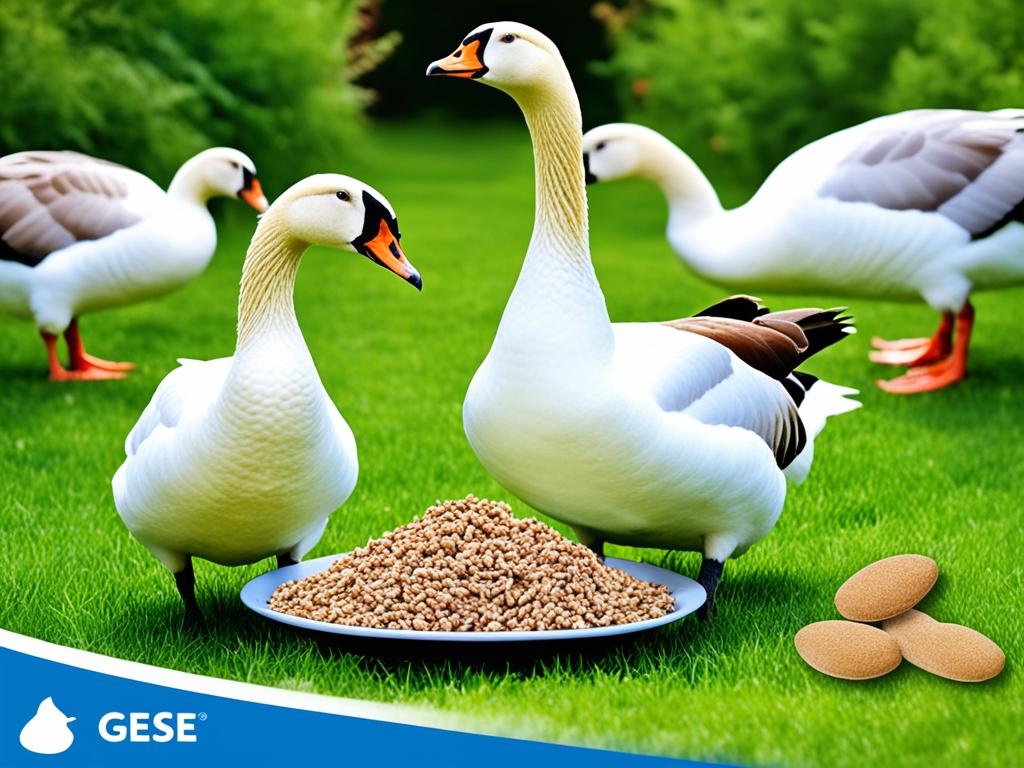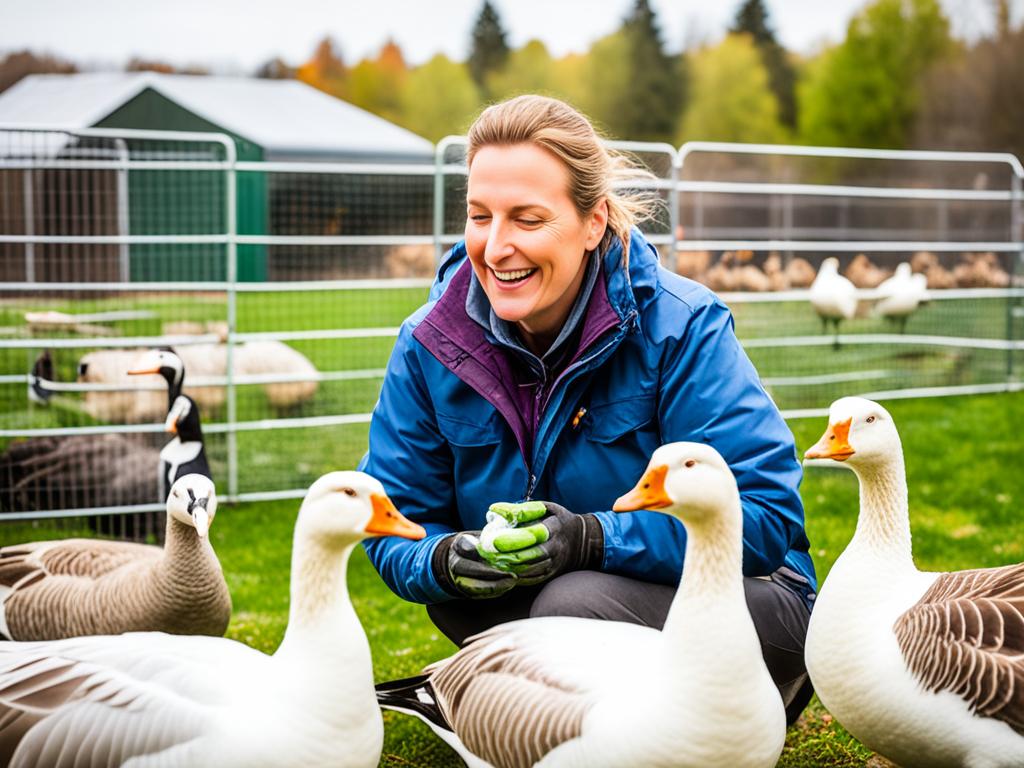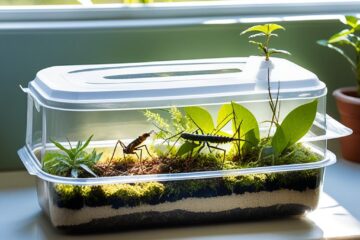Have you ever looked into the gentle eyes of a pet goose? It’s a moment that touches your soul and fills your heart with warmth. Perhaps you’ve dreamed of raising geese as pets, imagining the joy of their company and the unique bond that can form between humans and these magnificent creatures.
If you’re ready to turn that dream into a reality, then you’ve come to the right place. Welcome to “The Ultimate Guide to Raising Pet Geese,” where we will take you on a journey of discovery, providing you with all the information you need to raise geese as beloved companions.
Key Takeaways:
- Discover the joy of raising geese as pets.
- Learn valuable tips and advice on how to care for your pet geese.
- Explore the unique bond that can form between humans and geese.
- Find out how to create the perfect environment for your geese.
- Understand the importance of proper nutrition and health care for your feathered friends.
Understanding Geese Behavior and Needs
Before embarking on the journey of raising pet geese, it is important to understand their behavior and specific needs. Geese, known for their intelligence and sociable nature, require proper care and attention to thrive in a domestic setting.
Flock Mentality
Geese are highly social animals that form strong bonds within their flock. They rely on each other for safety and companionship. Therefore, it is recommended to keep at least two or more geese together to ensure their well-being and happiness.
Nesting Habits
Geese are monogamous creatures and typically mate for life. They build nests on the ground near water bodies, where the female lay their eggs. It’s crucial to provide a safe and comfortable nesting area for your geese, ensuring they can reproduce and raise their young effectively.
Feeding Patterns
Geese are herbivores, primarily feeding on grass, plants, and grains. In addition to their natural diet, supplemental feeding with specially formulated feeds is recommended to ensure they receive essential nutrients. A balanced diet must contain an appropriate amount of protein, carbohydrates, vitamins, and minerals to support their growth and enable them to lead a healthy life.
Tip: Avoid feeding geese bread, as it lacks nutritional value and can lead to health problems for the birds. Instead, opt for commercial poultry feeds or consult a veterinarian for a suitable diet plan.
Water and Swimming
Geese are water-loving birds and require access to clean water for drinking, preening, and swimming. A shallow pool or pond should be provided for their enjoyment and to maintain good hygiene. Regularly change the water and ensure the area remains clean to avoid the risk of diseases.
Protection from Predators
As caring pet owners, it is essential to protect your geese from potential predators. This can be achieved through proper fencing, enclosing the outdoor area to prevent unauthorized entry. Additionally, providing shelter and secure housing during the night will ensure their safety from predators.
Understanding geese behavior and catering to their needs is vital for providing a nurturing environment for these captivating birds. By following these guidelines for geese husbandry, you can create a safe and comfortable space for your pet geese to thrive.
| Geese Behavior and Needs | Key Takeaways |
|---|---|
| Flock Mentality | Geese thrive in the company of their flock. |
| Nesting Habits | Provide a secure nesting area for breeding geese. |
| Feeding Patterns | Offer a balanced diet of natural foods and supplemental feeds. |
| Water and Swimming | Ensure access to clean water for drinking and swimming. |
| Protection from Predators | Implement measures to safeguard geese from potential threats. |
Creating the Perfect Environment
Geese thrive when they have a suitable environment that meets their specific needs. By creating the perfect living space for your pet geese, you can ensure their well-being and happiness. This section will guide you through the best practices for raising geese as backyard pets, including tips on housing, fencing, and providing a conducive outdoor area for them.
Housing for Pet Geese
When it comes to housing, geese require adequate shelter to protect them from extreme weather conditions and predators. A well-constructed shelter, such as a sturdy coop or a well-insulated barn, is essential. Make sure the shelter is spacious, allowing each goose to have enough room to move around comfortably.
It’s important to keep the housing clean and free from dampness to prevent the buildup of bacteria or mold. Regularly remove any waste or soiled bedding and replace it with fresh materials. This will help maintain a hygienic environment for your geese.
Fencing for Pet Geese
Fencing is crucial for keeping your geese safe and contained within their designated area. Geese are naturally curious and can roam quite far if they are not confined. A sturdy fence should be at least four feet high to prevent geese from jumping over it.
Consider using electric fencing or adding a wire mesh skirt to the bottom of the fence to deter predators from digging underneath. Make sure the fencing material is strong and securely anchored to the ground to withstand any attempts by predators or geese to break through.
| Housing | Fencing | Outdoor Area |
|---|---|---|
| Provide a well-constructed shelter | Use a sturdy fence at least four feet high | Create a spacious outdoor area for geese to roam |
| Ensure shelter is clean and hygienic | Consider electric fencing or wire mesh skirt | Provide access to water sources |
| Provide nesting boxes for female geese | Regularly check the fence for any damages or weaknesses | Offer shaded areas and protection from extreme weather |
Outdoor Area for Pet Geese
In addition to housing and fencing, geese need access to a suitable outdoor area. This area should provide enough space for them to roam freely and engage in natural behaviors. Ideally, it should include access to water sources, such as a pond or a shallow pool, as geese enjoy swimming and bathing.
It’s important to provide shaded areas in the outdoor space to protect the geese from excessive heat or harsh sunlight. Consider planting trees or installing umbrellas to create shade. Additionally, provide protection from extreme weather conditions, such as strong winds or heavy rain, by offering shelters or covered areas.
By following these best practices, you can create a perfect environment for your pet geese, ensuring their happiness and well-being. Remember to regularly monitor and maintain their living space to provide them with the optimal conditions for a fulfilling and enjoyable life.

Nutrition and Health Care for Geese
Proper nutrition and health care are crucial aspects of raising healthy and happy pet geese. By understanding their dietary needs and implementing essential preventive measures, you can ensure the well-being of your feathered companions. Here are some helpful pet geese care tips and guidance on raising geese as pets:
Feeding a Balanced Diet
Offering a well-balanced diet is key to keeping your geese healthy. Their nutritional requirements include a mix of grains, greens, and protein-rich elements. High-quality commercial goose feed can serve as a solid foundation for their diet, which can be complemented with fresh vegetables, such as lettuce, spinach, and carrots. It’s also essential to provide clean, freshwater for drinking and bathing.
Vaccinations and Preventive Measures
Just like any other pet, geese need routine vaccinations to protect them from diseases. Consult with a veterinarian experienced in avian health to determine the appropriate vaccination schedule for your geese. In addition to vaccinations, practicing good hygiene, maintaining clean living areas, and regular monitoring of their health can help prevent the onset or spread of illnesses.

“Taking a proactive approach to the health care of your pet geese can significantly contribute to their overall well-being. By ensuring a nutritious diet and implementing preventive measures, you can minimize their risk of illness and provide them with the love and care they deserve.”
For more detailed information on the nutritional requirements and health care practices for geese, refer to the research article on pet geese care tips and raising geese as pets.
| Nutrition and Health Care Tips for Geese | Raising Geese as Pets |
|---|---|
| Provide a balanced diet with commercial goose feed and fresh vegetables | Create a safe and comfortable living environment for geese |
| Ensure access to clean, freshwater for drinking and bathing | Practice good hygiene and regularly monitor the health of geese |
| Consult with a veterinarian for a vaccination schedule | Implement preventive measures to minimize the risk of illnesses |
Conclusion
In conclusion, “The Ultimate Guide to Raising Pet Geese” has provided pet owners with a comprehensive overview of raising geese as pets. By understanding the behavior and specific needs of geese, creating the perfect environment for them, and ensuring their nutritional and health requirements are met, you can embark on a fulfilling journey with your feathery companions.
Implementing the best practices outlined in this guide, you can create a suitable living space for your pet geese, including proper housing, fencing, and outdoor areas. Additionally, by providing a balanced diet and proper health care, such as vaccinations and preventive measures, you can ensure the optimal well-being of your geese.
If you are looking for more information on humane goose control, you can refer to this resource. For tips on habitat modification, this manual can provide valuable insights.
With “The Ultimate Guide to Raising Pet Geese” as your go-to resource, you have all the tools and knowledge to ensure a happy and healthy life for your pet geese. Enjoy the rewarding experience of raising these wonderful creatures and create lasting memories together.




